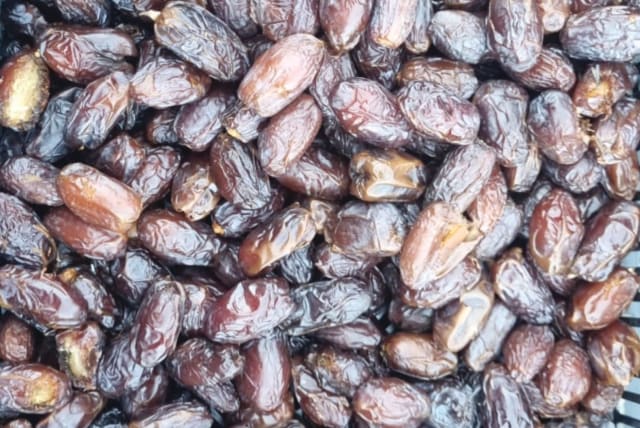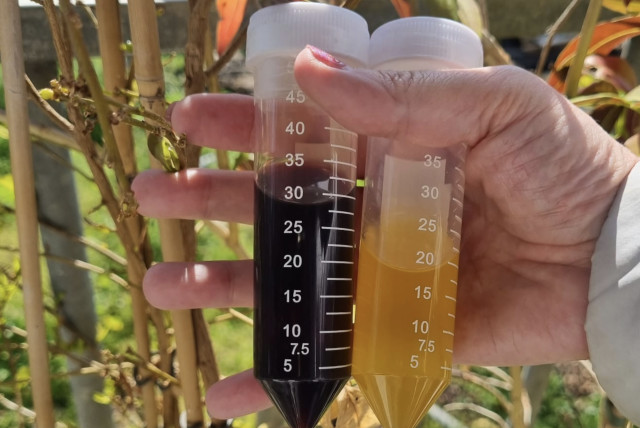Are dates the new peace-building superfood?

Experts say there are financial speedbumps ahead for Israeli food tech and environmental startups like Dayts, especially as Israel endures a period of unprecedented political unrest.
Michael Ofran, a date and vegetable farmer from the Arava, rode his bike home one morning a few years ago when he took a wrong turn and got lost in the broiling desert. It seemed the more water he drank, the hotter and sicker he felt.
When he finally made it home, his sister reminded him that he needed more than just water to battle the heat. His body needed minerals, electrolytes and other essential nutrients, too. Ofran began thinking about the date trees on his farm. Could dates, the nutritious and revered blessed fruit of the Bible and the Koran, become a superfood for the modern era?
Now several years later, Ofran and his colleagues say the answer is a resounding “Yes.” His Israeli startup company, Dayts, is getting seed money from global investors to develop new date-based natural ingredients for use as shelf-life extenders and nutritional supplements for everything from meat products to baked goods. They also have plans to use the natural antioxidant power of dates in industries, such as pharmaceuticals and cosmetics.
What’s more, their food products can use waste materials from a variety of dates that most farmers ignore or discard, saving energy and reducing climate-altering emissions like methane.
That could have a big climate-fighting potential for the growing $13 billion (NIS 48.5b.) global date palm industry. And as the climate gets hotter, date trees are better acclimated to the heat and will suffer less than other crops, making them an ideal fruit in the era of climate change.
Financial speedbumps in the future of Israeli food tech
Still, experts say there are financial speedbumps ahead for Israeli food tech and environmental startups like Dayts, especially as Israel endures a period of unprecedented political unrest. Frightened by ongoing political protests and economic concerns, credit agencies have warned about downgrades to Israel’s credit ratings, while some banks and investment funds have reported increased capital flows out of the country.
Despite these financial headwinds, the venture capital world is still alive and well in the “startup nation.” The industry’s innovative spirit was on full display at the 2023 OurCrowd Global Investor Summit in Jerusalem, last February, where thousands of participants and investors gathered in person for the first time since the pandemic. Over its 10-year history, OurCrowd has raised over $2b. (NIS 7.5b.) in commitments for hundreds of startup companies looking for capital, and leaders say investments continue.
THIS YEAR, the summit highlighted a multitude of environmental startup projects, ranging from reforestation using drone technology to an array of new pollution control devices and energy-efficient food technologies. “Working with partners old and new, we can transform the Middle East into a net-zero region a global hub of sustainable solutions in food, water and health,” President Isaac Herzog told attendees.
There is a good reason the investment community is focused on green tech. Scientists say energy-efficient, nonpolluting technology is critical to fighting climate threats in the Middle East, which is heating up twice as fast as the global average and faces increasing dangers of deadly drought, blistering hot temperatures and rampaging rising seas.
Climate experts agree the Israeli government is not moving fast enough to plan for the increasing dangers associated with a rapidly warming climate, making it even more important for the investment community to fund new green technologies.
While the government has been slow to fund specific climate plans, nonprofits have stepped up. The Arava Institute for Environmental Studies has trained and educated thousands of young people from all walks of life. Many go on to work for green technology startups and businesses. “We use environment and science as a diplomacy tool to connect people,” executive director Tareq Abu Hamed told a meeting of journalists in Jerusalem, earlier this year. “We use environmental issues to build trust.”
It seems to be working. Last year at the UN climate meeting in Egypt, a landmark Memorandum of Understanding (MOU) was signed between Israel and Jordon to swap solar energy power for desalinated water supplies. Experts say these are the kinds of policies that can spur sustainable business development in the region.
“The big elephant in the room is the climate crisis,” Gidon Bromberg told climate journalists. Bromberg worked on the MOU between Jordan and Israel, and he has a long track record of bridging international environmental agreements as co-founder of EcoPeace Middle East. “If we don’t learn and create the political will to work together, then the climate crisis will bring us all down.”
Many Israeli startup leaders agree. “We all have the same vision... Helping create a more peaceful environment with prosperity,” explained Shira Shaked Hemi, who has worked in the corporate food industry and is now the CEO of the women-led Dayts startup that includes the noted scientist and antioxidant expert Dr. Rina Reznik.
After all, dates have long been considered a blessed fruit in all corners of the Middle East. Now, she says, it’s time to put their sacred powers to work.
The writer is an independent journalist based in the Washington, DC area. He traveled to Israel in February with other journalists to report on climate issues funded by a grant from the Jerusalem Press Club.
Jerusalem Post Store
`; document.getElementById("linkPremium").innerHTML = cont; var divWithLink = document.getElementById("premium-link"); if (divWithLink !== null && divWithLink !== 'undefined') { divWithLink.style.border = "solid 1px #cb0f3e"; divWithLink.style.textAlign = "center"; divWithLink.style.marginBottom = "15px"; divWithLink.style.marginTop = "15px"; divWithLink.style.width = "100%"; divWithLink.style.backgroundColor = "#122952"; divWithLink.style.color = "#ffffff"; divWithLink.style.lineHeight = "1.5"; } } (function (v, i) { });

